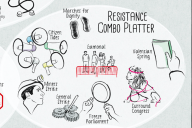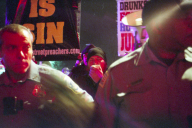A new book claims that twee culture is politicizing the youth and changing the world for the better, but can sweaters & sweetness really fix what ails us?
Even if you never met me in college, you’d recognize my type. I owned and too frequently wore a secondhand, salmon pink blazer. My housemates and I hosted the after parties whenever indie rock shows came through campus. I subscribed to the Believer, listened to the Smiths, and wrote quirky short stories. I spent an ungainly amount of time feeling feelings that ranged from un- to semi-requited. Yeah, I still wore my Dead Kennedys shirts, but like Margot Tenenbaum’s eyeliner, this was just a bit of punk rock ribbon on a package that was essentially twee.
So I was surprised—shocked, really—when several female staffers on the campus paper I edited expressed concern that our leadership was something of an old boys’ club. Yeah, I conceded, most of the people who make the decisions are guys, but that’s just because it happens to be the men who stick around late at the office when everything comes together together. It’s really a coincidence. Plus, look at us! We’re in touch with our feminine sides. We listen to Regina Spektor and read Alice Munro! For fun! Aren’t I always polite and nice to you? Besides, I’m introverted and sometimes my feelings get hurt. Do I look like the kind of guy who’d run some cock rock journalism operation?
Thusly I dismissed the thoughts & feelings of women I (genuinely) liked and (ostensibly) respected. A few months later I moved to Williamsburg.
![]()
Marc Spitz’s recent book Twee: The Gentle Revolution in Music, Books, Television, Fashion, and Film—released in June by HarperCollins—reverently genuflects before the Twee Stations of the Cross. Holden Caulfield. Morrissey. McSweeney’s. Mumblecore. If you’re interested in hip culture, it can be a fun read, an upbeat collection of indie begats. (The Olympia, WA music scene begat KAOS-FM begat Calvin Johnson begat Beat Happening, and on and on.) Some of the details in its genealogy are debatable—can twee rightfully stake a claim on the hard-rocking, dope-addicted Kurt Cobain or the deviant, Warhol-cool Velvet Underground?—but for the most part, all the main founts of tweedom are named and accounted for. It’s a geekily thorough chronicle of a subculture that prides itself on geeky thoroughness. However, Spitz—who self-identifies as twee—is quick to take the Twee Tribe’s conspicuous declarations of its own sweetness and openness at face value. Twee, he writes, is pulling us all toward “a better, kinder, humbler, more politicized, and ‘so pure’ human race.”
Even setting aside the faintly sinister idea of a “’so pure’ human race,” the claim is a weird one. The borders of twee are fuzzy, and the constellation of characteristics Spitz offers in lieu of a definition, traits like an ethic of “Beauty over ugliness” and “A tether to childhood and its attendant innocence and lack of greed,” seem appropriate if nebulous. But if we’re going to try to pin down the crux of twee culture—now more or less coterminous with the softer hipsterdom that followed the swaggering early-aughts heyday of Vice Magazine, the Strokes, and a white trash fetish that brought PBR & trucker hats to art schools everywhere—it’s more about an affect (niceness) and an aesthetic (cuteness) than any commitment to politics. As my twee-inflected collegiate obliviousness shows, a mannered quirk isn’t much of a bulwark against sexism, racism, or other kind of injustice. Some of twee’s tendencies can even predispose it to a kind of elitism or political reaction. I’m not saying every song or book needs be an instrument of social justice. Politically problematic art can be great art, and it’s often a lot more compelling than work that hews too closely to any kind of orthodoxy. Things get squirrely, though, when you start arguing, as Spitz’s seems to do, that your choices of what records to buy, what cardigans to wear, and what books to read constitute an adequate or meaningful form of political engagement.
![]()
In his study of 19th century French men of letters, sociologist César Graña observed that bohemians form a “peculiar aristocracy.” Their famed loathing of the bourgeoisie is different from that of an old school communist. Marx admired the productivity and efficiency of bourgeois capitalism. He didn’t dream of destroying the factory. He just wanted to wrest it from the exclusive control of any one class and spread the fruits of rationalized, industrialized production to everyone equally.
In contrast, bohemians from the Romantic Era onward wanted to abandon the factory and the social order that came with it. The ideology of the mass-produced, the interchangeable, and the useful was both a threat and anathema to those who understood their life’s work to be the articulation of an individual vision. Bohemians resented “the man of measurable ends, the undertaker of services (civil, managerial, or economic), the careful and reliable personality, the job-performer, the producer.” They were at odds with both the proletariat that made the widgets and the bourgeoisie that managed their assembly. Unable to cleave themselves to a social order that had little room for them, the original Parisian bohemians identified with a fast disappearing class that valued personal cultivation over productivity for productivity’s sake and whose patronage had once buffered artists and intellectuals from the demands of the market. The bohemians became aristocrats. From Graña:
Romantic intellectual pride is the pride that attaches to wholly individualized dexterity or to purely personal spiritual possessions, and which, consequently, must deny worth to all those who are bound to routine duties. […] Freedom is glorious because it is “creative,” and it is “creative” because it constitutes a display of gratuitous personal originality. By contrast, labor is repressive and inglorious because it is spiritually unfree and condemns its servants to a compulsive monotony. Freedom, which is the realm of spontaneity, generates and presumes peculiarity; work is the lot of the undifferentiated masses.
To the bohemian, the practical concerns of both labor and management were indicative of a base sort of humanity. They sacrifice the chance at transcendence and transform people into appendages to machines. Redemption is found in the unique and handcrafted, and nostalgia for pre-industrial eras proliferates. In other words, the artisanal pickle is freedom; a Vlasic is the lot of the undifferentiated masses.
![]()
I can get down with the Field Mice as much as the next liberal arts major. If you put Beat Happening on at a party, I probably won’t change the song. But if you enjoy Cub’s “My Chinchilla,” please, please don’t tell me. The fate of our friendship might hang in the balance.
![]()
Rushmore was Wes Anderson’s breakthrough film, but in an inexcusable abrogation of my Brooklynite duties, I’d never seen it until this summer. When I finally watched it, I found myself looking with two sets of eyes: the ones I’ve got now and the ones I wore a few years ago, when I was dumber. Jason Schwartzman stars as Max Fischer, a prep school teenager with a deceased mother and an obsessive crush on a recently widowed teacher. Ms. Cross (Olivia Williams, charming) rebuffs him. He forcefully tries to kiss her. She has to physically push him to the ground to escape. He climbs in her bedroom window and claims to have been hit by a car. He coos some words about her dead husband. She kisses him in a moment of weakness, then throws him out when she discovers the blood smeared on his head is fake. Max goes on to cut the brakes in the car of his “rival” for Ms. Cross’ affections. At the film’s end, our hero takes up with a girl his own age, one he’d been cruel to throughout most of the movie. The final scene shows him dancing with Ms. Cross, the pair of them awash in the light of inexplicable indoor fireworks. We’re meant to understand that he’s matured. Maybe he has. But the character we’ve spent the previous 90 minutes with has bordered on sociopathic, his narcissism portrayed as excusable because hey, he’s hurting, too.
There should be movies about creeps. Art can help us flesh out the psychologies of everyone, both the well-adjusted and the not-so-much. But if Rushmore even suspects that its protagonist is being profoundly creepy, it’s willing to turn up the volume of its poppy ‘60s soundtrack and hope you don’t notice. A few years ago, I wouldn’t have noticed. I might have squirmed with secondhand embarrassment as Max flailed in his pursuit of romance, but I would have felt uncomplicated in rooting for the sad, young twee man. Watching it at the age I watched it, though, after some years of growing up, getting over myself, and getting close to real live women, Max left me feeling grossed out, much like I felt during Anderson’s latest film, The Grand Budapest Hotel, when Ralph Fiennes approves of his lobby boy’s fiancée because he admires “her purity.” It begs the question, what would make this young woman impure? And how would Fiennes feel about her then?
![]()
All bohemias are their own kinds of aristocracy, founded on a dream of liberation from mundane production in favor of nurturing an individual sensitivity. This is true even of the bohemian subcultures that, like punk, grow out of the working class or that, like the Beats, valorize the poor & marginalized. But similar to the dandies of Baudelaire’s day, twee adopts the trappings of aristocracy as its own aesthetic. Think of the prep schools and sophisticated Manhattan townhouses that populate the imaginations of JD Salinger and Wes Anderson, or of the complicated and expensive meals lovingly photographed for foodie blogs or Instagram. Think of ten-thousand-dollar vinyl collections. Think of Morrissey, whose professional career has been spent cultivating the persona of an aloof, droll, and world-weary fop—a Thatcher-Era Oscar Wilde. And the demographic that twee art & culture speaks to usually, though not exclusively, reflects this. In his first few pages, Spitz himself wonders, “Am I writing a book for well-off white people?”
Maybe this is fine, honest even. Twee surfaces the elitism of bohemianism and wears it proudly as a pair of tortoiseshell glasses and an English degree from Swarthmore. It’s doesn’t pretend to a poverty it doesn’t actually have. I’m only partly joking when I say that I’m glad that there’s art out there that makes shy, educated, middle-class, white kids feel like somebody gets them. This is a good thing. It’s nice when people don’t feel alone. Our culture would be poorer without the smart, often insightful work of twee-folk like Noah Baumbach, Dave Eggers, and Miranda July.
But it’s pretty gross to answer introspection about twee’s race and class homogeneity by saying, as Spitz does, that “I remind myself that to even question that is part of the problem. Twee, like Punk and Hip-Hop, no matter who pioneered it, is at its best pure and open, a meritocracy and a good party.” Oh, Marc Spitz? He doesn’t see color. Some of his favorite Donald Glovers are black. And the working class? If they stay on the hip & narrow, they can pull themselves up by their Chuck Taylors and become as twee as you & me.
One of art’s most important functions is to interrogate us and force us to examine ourselves. By aligning itself with an affect, though, with politeness and niceness and adorability, twee is ill-suited to push us very hard. As a general rule, it would rather allow you to go on being awful than make you feel bad about it. In an essay for the Baffler, Ethan Thompson proposed that the gentle teasing of the sketch comedy show Portlandia serves as a kind of therapy to help aging hipsters “work through” their ambivalence about the bourgeois bohemians they’ve become. But in its relative toothlessness, Portlandia commits artistic malpractice. “Therapy, after all, isn’t just about making you feel comfortable,” Thompson writes. “It’s about looking back, reconnecting with how you once felt, and trying to understand what got you where you are now.” When twee–when Spitz–looks back, it’s not in analysis. It’s in nostalgia.
![]()
“Consumerism is no longer about ‘conformity’ but about ‘difference.’ Advertising […] counsels not rigid adherence to the tastes of the herd but vigilant and constantly updated individualism.”
~Thomas Frank, “Why Johnny Can’t Dissent”
“The trick is to realize that the boys who talk so much about being rejected that it seems like they’re proud of it aren’t necessarily sweeter or more sensitive than the Bababooey-spouting frat bullies who line up at clubs like SkyBar to run game on girls they want to date rape. There are plenty of nerds who fear women and aren’t sensitive, despite their marketing; they just dislike women in a new, exciting way.”
~Julie Klausner, I Don’t Care About Your Band
“True he likes the Breeders.
He thinks Green Day’s pretty swell.
But what about the Bartlebees and Neutral Milk Hotel?
It’s okay for a sunny day but that Sting album won’t do.
So when I play you Allen Clapp, you’ll know baby I love you!”
~Tullycraft, “Pop Songs Your New Boyfriend’s Too Stupid to Know About”
![]()
A twee kid is certainly not the worst thing a person could be. Like Graña’s original dandies, the Twee Tribe “dreams of an aesthetic asceticism in which all impulses are directed toward artistic craftsmanship and all dedication to the perfection of the personality alone.” Going twee is a choice to cultivate your own life, to make beautiful the space around you and those you care about, to interact with the world with some level of aesthetic intention. The appreciation of beautiful things makes life livable, and days are easier to get through when people aren’t rude. This isn’t nothing, but we shouldn’t pretend it’s “a gentle revolution” either. As Judy Berman asks in a review of Twee, “Is a politics of kindness and gentleness really so daring when it comes from a position of bourgeois comfort, from artists whose greatest struggles typically spring from having been shy, bookish children?”
I’ve written before on the limits of snark. A twee niceness is snark’s mirror image, more pleasant, but as a guiding principle, almost as vacant. Niceness is an affect, a surface level tendency. A lot of the gamblers on Wall Street who wrecked a generation’s economy are really nice bros. Some of the soldiers shelling schools in Gaza are probably teddy bears around their families. The twee boys running our college newspapers might be really polite as they discount women’s opinions. Niceness doesn’t necessarily speak to any deeper commitment to justice. In fact, it can be used to gloss over it. We can congratulate ourselves on our goodness for not berating our waiters, beating our kids, or casually dropping the n-word. We can write books about how we’re saving the world with our good manners and our original pressings of The Queen is Dead. We can eat our organic, locally grown kale while the world burns around us.
But either way, I’m keeping my subscription to the Believer.


















